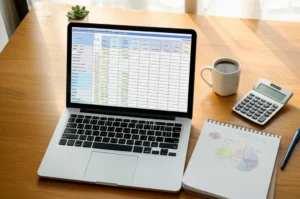You ever feel like your paycheck disappears before you even touch it? Like, it’s gone—poof—rent, groceries, bills, maybe a pizza, and suddenly it’s the end of the month and you’re scraping coins out of coat pockets, wondering how it all happened again.
If that sounds familiar, don’t worry. You’re not alone, and (look, hear me out) you can actually budget and save money on a small income. Real talk: small steps matter more than you think. Let’s dive in, skip the boring lectures, and get straight to what actually helps.
Quick Action Plan
Here’s the deal. You don’t need some fancy spreadsheet or financial degree—just a willingness to peek at your habits and tweak a few things. Start here. Today.
1. Know Your Real Monthly Income
Not your “kinda, sorta” guess. Pull up your bank app (yeah, right now). Grab your pay stubs, any child support, gig payments—all the income streams. If your pay is erratic, do yourself a favor: use either your lowest recent month or average out the last 3 months so you don’t overestimate and end up short lateraccording to ATB Financial.
Quick Checklist:
- Salaries from all jobs
- Side hustles, gig work
- Benefits, alimony, support
- Subtract taxes and deductions
2. Track Every Dollar (Just for Two Weeks)
This is the least fun part but—wow—does it open your eyes. Write down every. single. thing. you spend money on, even that $2 snack. Apps are handy, but a notebook or your phone notes work fine. You’ll likely spot money leaks you didn’t know about. I remember thinking, “$8 for takeout isn’t so bad…” until I realized takeout happened four times a week. Yeah. That adds up according to the Financial Consumer Agency of Canada.
Simple Tracking Template:
| Date | Item | Category | Essential? |
|---|---|---|---|
| 09/04 | Bus Fare | Transportation | Yes |
| 09/05 | Coffee | Food | No |
3. Cover the “Four Walls” First
This isn’t just a financial cliché—it’s gold. Make sure your food, shelter, utilities, and transport are covered before anything else. Doesn’t matter if it’s glamorous, matters if it’s handledaccording to Ramsey Solutions.
- Food (groceries first, eating out second)
- Rent/Mortgage and necessary household
- Utilities (power, water, phone/internet—trim where possible)
- Transportation (bus pass, fuel, minimal repairs)
4. Make a Bare-Bones Starter Budget
This is where the magic starts. Grab everything you tracked above and sort it into three buckets: Fixed Expenses (rent, insurance), Variable Expenses (groceries, the odd coffee), and Savings (even if it’s micro-sized). Give every dollar a “job”—that’s called zero-based budgeting. If you’re stuck, you can find a how to make a monthly budget resource here that walks you through it with examples.
5. Start Small, Automatic Savings
Now, I get it—saving five bucks when you don’t have five bucks feels delusional. But setting something aside (even if it’s literally $5 per paycheck) builds security and confidence. Many banks let you auto-transfer a tiny amount; trust me, when you open your savings after a year and see $100, it’ll surprise you. It’s about building that “I can do this” muscle according to Bank of America.
Budget Methods That Work
Zero-Based Budgeting
Think of this method like giving every dollar a “mission.” If you make $1,300/month, that whole $1,300 is assigned jobs: bills, groceries, “future me” savings, etc. At the end, your income minus expenses (including savings) = zero. It’s not “spending everything”; it’s just organizing everything. This helps you avoid random manhunts for missing money.
Why It Works:
- Every dollar is accounted for
- You see instantly where you can cut back if needed
It really shines on a small income, because even the leftover $10 isn’t lost in the budget—it’s got a purpose, even if that purpose is “treat myself to a coffee once this month.”
Priority-Based Budgeting
Forget the endless debate about “wants” vs. “needs.” Instead, list your essentials, then your biggest financial goals, then “nice-to-haves.” You spend in order, and if you run out of cash before you hit “streaming subscriptions” or “extra takeout,” that’s your cut line. Not fun, but hella honest. (A lot of people find this less stressful—it removes guilt and guesswork.)
Envelope or “Bucket” Method
This is a classic. Your paycheck is split into literal envelopes or dedicated accounts—one for rent, another for groceries, another for bus fare. When the envelope’s empty, you stop spending. Perfect for folks with pay that bounces around or who struggle to keep digital money mentally separate.
Paycheck Smoothing
If you get paid different amounts or at random times, estimate the very minimum you absolutely need to get by each month. Use your lowest expected month as a baseline, and if there’s extra, that’s bonus money for savings, debt, or an overdue treat. Build a buffer first—one month’s living expenses is life-changing on a small income but takes time, so go easy on yourself.
Save Money — Realistic, Reliable Ways
Grocery Costs (Without Feeling Deprived)
Here’s where most folks slip. Planning meals, buying store brands (which, honestly, often taste the same—you’re just not paying for commercials), and writing a tight grocery list makes a HUGE difference. Eat before you shop. Small things, like skipping the pre-cut veggies or fancy snacks, add up. Just last month, I swapped two name-brand items for the house version. Saved $16 that week alone.
| Swap This | For That | Possible Savings |
|---|---|---|
| Brand-name cereal | Store brand | $2-4 per box |
| Pre-cut veggies | Whole veggies | $1-3 per bag |
Slash Utility and Subscription Costs
Turn down the thermostat, use LED bulbs, unplug “vampire” devices (yup, they suck energy—and money—even when off). Review subscriptions—music, TV, unused fitness apps—and cut ruthlessly. You’re not giving up forever; you’re just choosing what matters now.
Get Smart With Transportation
If possible, take the bus more, split rides, or walk. I know not everyone can ditch a car, but if you can, your wallet will notice. At the very least, keeping your car in good shape—air in the tires, oil changes—prevents “surprise” bills later.
Stop the Leak: Impulse & Recurring Spends
Ever do that thing where you blink and realize you spent $40 on…what, exactly? Implement the “24-hour rule”: wait a day before buying anything not on your essentials list. Audit your recurring expenses every couple months—a lot of my friends got rid of auto-charging subscriptions they forgot years ago. That’s found money.
Tap Community Resources and Discounts
Look, there is no shame in using food banks, community pantries, or applying for local discounts if you’re eligible. These things exist for a reason, and using them gives you breathing room so you can get to a healthier financial place. Sometimes we all need a hand.
Shop Smarter, Not Harder
Always check for coupons and cashback deals, even for essentials. Buying used (clothes, dishes, even small appliances) can be a surprisingly good way to save—and you’d be amazed what you can find. Little things stack up.
Rethink Housing
Consider negotiating your rent, seeking roommates, or investigating local assistance programs. Yes, these changes are big—but even moving one step closer (like talking to your landlord about a temporary break or utility help) can relieve some pressure, even if not right away.
Lower Healthcare and Prescriptions
Ask your doc about generic meds (they can be literally pennies on the dollar). Local clinics and free/reduced services are more common than you think—don’t be afraid to ask. Saving a few bucks on prescriptions or a checkup can go straight to your emergency cushion.
Earning Extra — The Not-Overwhelming Way
This isn’t just about cutting back. Sometimes, the only way forward is bringing in a little more. Side gigs, online surveys, selling stuff you don’t need, or picking up a few extra hours—if you can, do what you can without burning out. One of the most clever things you can do is focus your savings on getting training for a better-paying job—which is exactly the kind of tip you’ll find on clever ways to save money.
Behavioral Savings Tricks (That Add Up)
Try “round up” savings: every time you buy something, round up and move the leftover to your savings, or try no-spend days once a week. Toss your grocery underspends into savings instead of rolling them over (“Hey, $3 left from groceries? That’s future pizza, in the bank!”). It might sound small, but these behavior tweaks add up, especially over months.
Why Budgets Help You Reach Goals
Budgets are less about saying “no” and more about saying “yes” to what matters. Yes to getting out of panic mode. Yes to noticing progress. Small wins, like building up a $500 emergency cushion, make you braver—and yes, you can get there. Budgets help you measure progress, hit milestones, and actually see your journey (instead of just feeling vaguely overwhelmed all the time). They are the roadmap between here and your dreams, even if it’s just “avoiding another late fee” at first according to the Financial Consumer Agency of Canada.
If you want more structure, check out this step-by-step on how to make a monthly budget. Spoiler: small, steady steps beat big, unsustainable changes—every single time.
When Debt’s A Challenge
If high-interest debt is eating your lunch, you’re not failing—you’re just fighting a tough battle. Focus on the urgent stuff (like keeping the lights on), but do what you can to throw even a pinch at debts with the highest rates. Call your creditors and ask for hardship plans, lower rates, or temporary relief—you’d be surprised how often they’ll work with you if you ask. And if it’s all too much, seek out non-profit credit counseling. No shame in backup.
Keep Momentum Going
Money habits are like brushing your teeth. Takes practice, breaks down now and then, but you get better by showing up, not by being perfect. Check in with your budget weekly—just a five-minute review to catch any weirdness. Stay realistic and reward yourself (yes, really) for sticking to changes, even when it’s just “I made coffee at home twice this week.” Progress is progress. Visuals help too—a sticky note savings chart or a digital tracker can make those invisible wins feel, well, visible.
Sometimes, You Need More Than Cuts
If you feel like you’re cutting back to the bone and still can’t keep up, pause and look outward. Could you upskill with a free or affordable certificate? Ask your employer about small raises or more hours? Pick up a side gig that doesn’t wreck your life? Even a little extra can break the cycle faster than you imagine.
Also, investigate if you qualify for public benefits or tax credits—sometimes you leave cash on the table just because you didn’t know you were eligible.
Expert Help & Real-World Stories
The best advice comes from people who’ve lived it—not just some textbook. Like my buddy Sarah, a single parent working two jobs, who started with nothing and just tracked her spending for a month. She found a $30 monthly “leak” in little things, put it toward her phone bill, and used her old phone for free entertainment. Tiny, consistent wins make real change.
Or Mike, who set up a budget using envelopes and found he could put $10 a month toward a rainy-day fund. After a year, he paid off an overdue bill without borrowing from family for the first time ever. That, to me, is what success feels like.
Don’t be afraid to browse expert tips from trusted places—banks, non-profits, even government agencies (I’ve sprinkled a few “according to” links throughout here). Your experience is unique, but you are NOT alone.
Conclusion
Look, I’m not here to sell you a fantasy. Budgeting and saving money on a small income is tough, sometimes maddening. But it’s doable, one honest step at a time. Know your income, track your spending (even the dumb stuff!), take care of essentials first, and use budget methods that feel right for you. Save something—even if it’s so tiny it feels silly. Tap into community resources and don’t be afraid to ask for help or check out how to make a monthly budget or clever ways to save money for a bunch of down-to-earth tactics. And please remember: you’re allowed to take small steps, to slip up and try again, to celebrate every win—no matter how tiny. What’s one habit you could change this week? That’s where your story starts. If you have questions or just want to share your experience, let’s talk about it. The climb is real, but so (honestly) is your ability to get there—slow and steady, one paycheck at a time.













